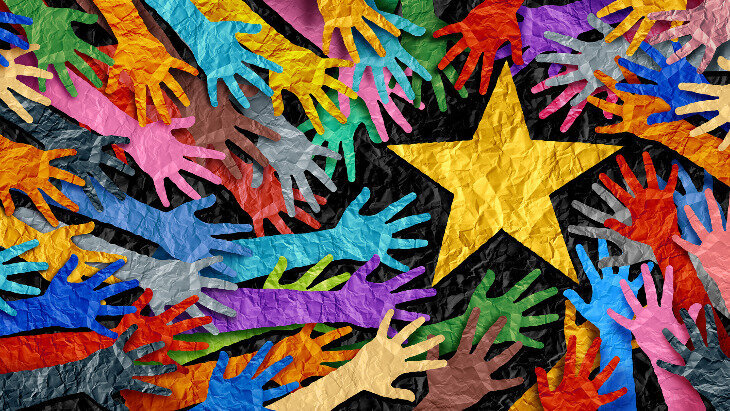 Vampire Weekend's Surprising Jewish Stories
Vampire Weekend's Surprising Jewish Stories


5 min read
Give yourself – and others – permission to be human.
Growing up, aspiring to be a perfectionist was not just a personal goal but a cultural badge of honor. Society rewarded high-level achievers and workaholics. In my generation, being tired, overworked, and stressed was a virtue!
Today, Wikipedia defines perfectionism as “a personality trait characterized by a person’s striving for flawlessness and setting high-performance standards, accompanied by critical self-evaluations and concerns regarding others’ evaluations.” Even if Wikipedia had existed back then, my reaction would have been something like – wait, is that supposed to be a bad thing?
If relentlessly high standards didn’t drive me, who would I be? A slacker? Mediocre? If I’m self-critical and beholden to what other people think, isn’t it because these things matter? And if that drives a better result, isn’t the psychological pain worth it?
Brené Brown, a researcher on the topic of shame, burst on the scene in her viral TED talk on the power of vulnerability. In her subsequent book, The Gifts of Imperfection, she distinguishes between perfectionism and healthy behavior. “Perfectionism is not the same thing as striving to be your best. Perfectionism is not about healthy achievement and growth but the belief if we live, look or act ‘perfect,’ we will avoid the pain of blame, judgment, or shame. We think perfectionism will protect us when in fact, it’s what brings us down.” And it’s pervasive.
In 2018, before the pandemic, the WHO found that young people worldwide were suffering from depression and anxiety, caused by this “internalizing of a contemporary myth that things – including themselves – should be perfect.”
Is this a mental disorder of our time? Brown surmised that we picked up these ideas “along the way.” But how and when? Can we trace the origin of this mind virus?
If we pull back the curtain on the Hanukkah story, we may find an answer.
The Hanukkah story wasn’t only a war between the Jews and the Greeks; it was an internal conflict between the Jews who wanted to remain faithful to Jewish values and the Hellenized Jews who took on Greek culture and their values.
To the Greeks, beauty and aesthetics were supreme. In particular, the Greeks were fixated with the human body; the perfect body was an athletic one. The greatest compliment of the time was to compare a person’s physique to a statue. Naked athletic competitions went beyond the realm of sport and became a form of fanatical pagan worship. So eager were they to assimilate into Greek culture some men even underwent excruciating procedures to reverse their circumcisions so that they could participate.
What were the Greeks selling that was so compelling? To comprehend the power of the Greek message, you need to understand the Greek worldview. Rabbi Aharon Lichtenstein distilled the Greek outlook on the universe to three principles:
That which is revealed and perceptible is all there is.
All is within man’s grasp to understand.
Creation contains law and order, harmony, and beauty, which allows man to conquer and dominate the universe with his intellect.
If the universe contains no mystery and reflects no greater power, then existence in its totality is comprehensible and conquerable. And so, the task of mastering the world is achievable by man – the perfect man.
That’s a big belief!
But it’s not a Jewish one.
The Greeks were right – man is at the center of creation, but they left God out of the equation.
But doesn’t Judaism also place the human being at the pinnacle of creation and give him dominion over the world? The Greeks got that part right – man is at the center of creation, but they left God out of the equation.
We are the pinnacle of creation, yet we are nothing in the presence of God - before a hidden and unrevealed Being. As stated by Rabbi Jonathan Sacks: “Faith is not certainty, but the courage to live with uncertainty. I’ve been given mastery over creation, but before You, God, I am nothing – I know nothing.”
Brene Brown tells us imperfection is a gift, but Judaism goes even further in that imperfection is holy. In the morning prayers, we recite God's blessing for our every need. I used to think this meant that God provided “for” my needs. But the word “for” is not there. The simple and literal meaning is so more profound. The blessing is that God creates my needs. He makes me needy and imperfect – and it’s fantastic. I need God in my life, I need people, I need love, and I need joy.
If you had no needs and were perfect, your life would be meaningless and lonely. God created you to need because that is the basis of connection. Even pain and challenges are needed because they point the way to growth.
Perfectionism is a systemic virus that has been infecting humanity for over 2000 years. Unfortunately, for many of us, this battle is going on inside of us today. If you find yourself going down the dark rabbit hole of perfectionism, try these mental shifts:
Change “What will they think?” to “How can I improve?”
Change people pleasing to self-acceptance.
Change self-criticism to self-kindness and self-compassion.
As the exile of darkness, the Greek exile was a spiritual one whose effects are felt today. Perfectionism is about shame, and shame can only live in darkness. Hanukkah is about bringing light. So, lighten up! And spread it to others. Give yourself – and others – permission to be human. Now that’s a Jewish virtue.
